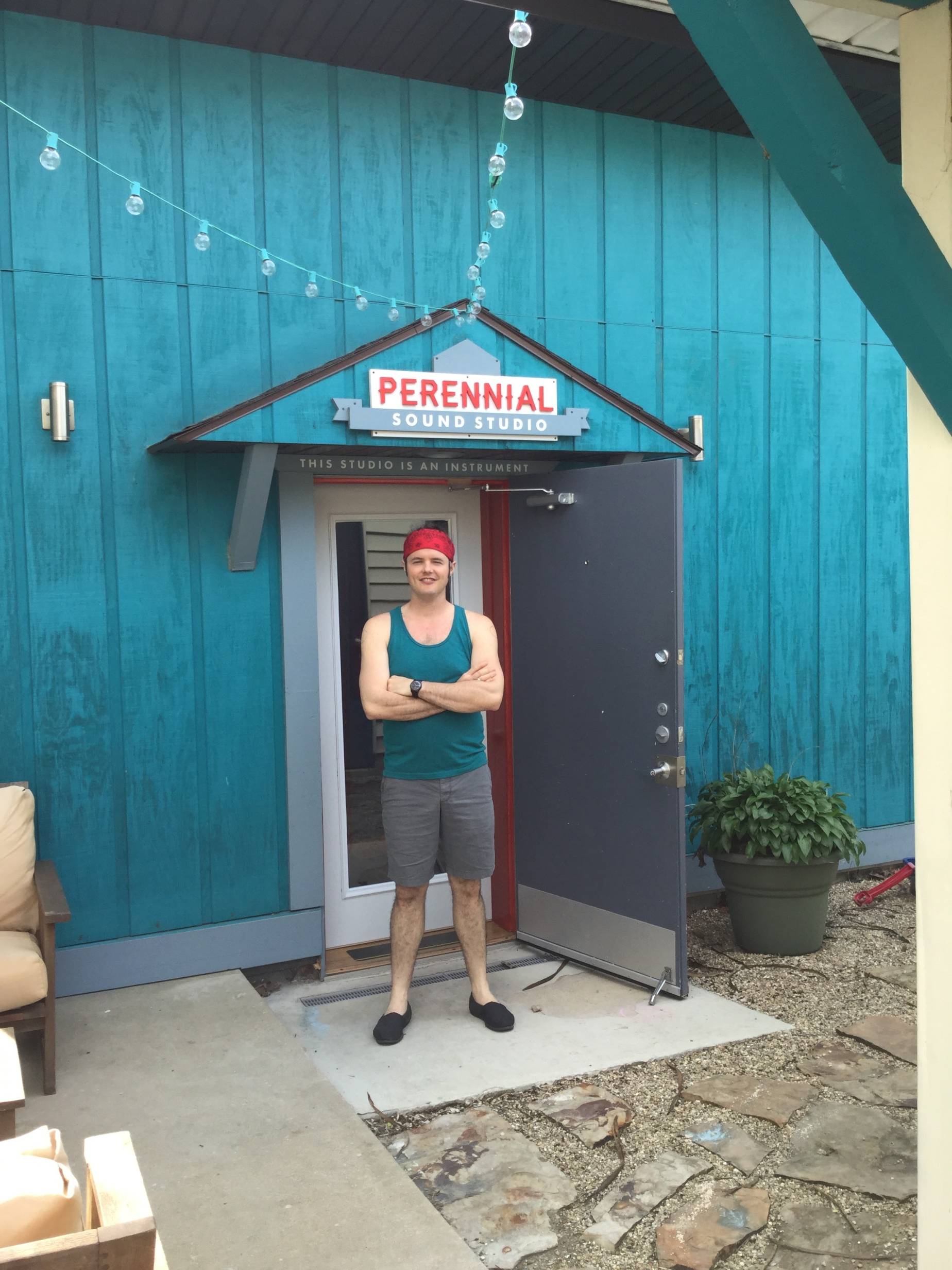I met with Ryan Groff, owner and operator of Perennial Sound Studio, in the middle of an unseasonably warm April. Groff is standing on his front porch as I walk up, holding a very adorable baby girl in his arms. He is wearing a red bandana that matches the furniture on the porch, and a slightly-turquoisey-blue tank top that matches the house’s trim and the porch. The house itself is white, and I realize (quickly! observantly!) that these are the colors of Elsinore’s most recent album covers. An implication is inserted into my brain that Groff is the frontman of his band 100 percent of the time, even when he is at Home Depot, picking out house colors; even when he’s picking out furniture; even when he’s running his studio.
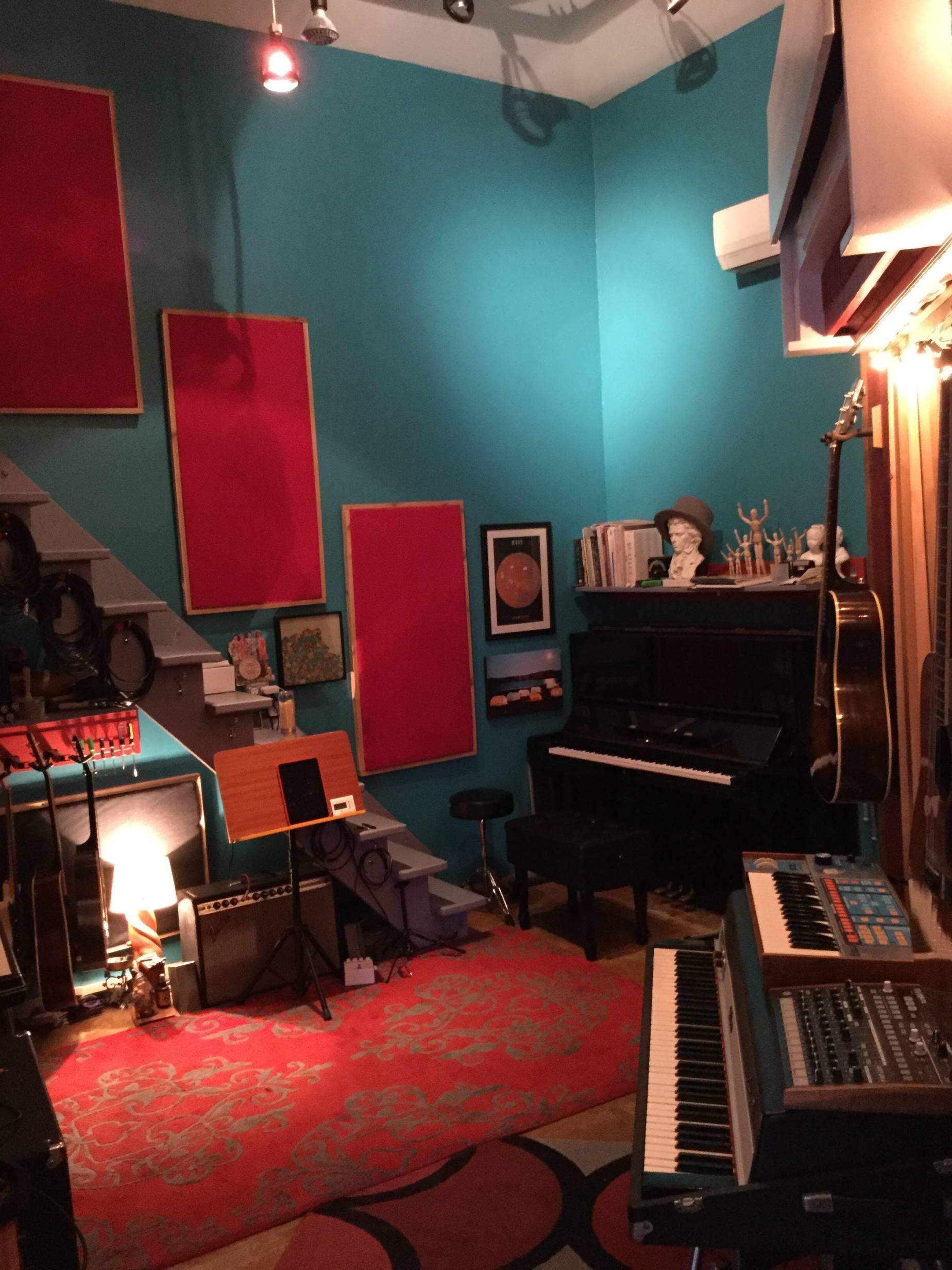
Groff talks very quickly, excitedly, and I think candidly, with infectious enthusiasm. Perennial Sound occupies a small building in his backyard. It is well done: small, but comfortable, with a control room, main live room, and a small drum room. Each room is sonically isolated, but visually connected, by windows. The rooms are treated with natural elements, and, of course, the turquoisey-blue/red/white theme. Guitars, organs, pianos, a bass, drums, and other assorted instruments line the walls, like an arsenal, or museum. A Rickenbacker 4001 bass, a white Gretsch Semi-Hollow guitar, champagne-sparkle Gretsch drums, and a little Fender Twin are all gleaming, enticingly. For all of the instruments crammed into this small space, it is well kept and tidy; cozy but not claustrophobic. I liked being in there.
Throughout the conversation, we discussed the motivating factors behind the studio, Groff’s goals as an engineer, how his roles as a music educator and musician bleed into his roles as engineer and producer, and the importance of a band aligning their studio expectations with reality.
Smile Politely: What made you become interested in starting a studio?
Ryan Groff: My Studio was intended for me to have a space to not only create music with Elsinore, and have a space like an office, but what I do, primarily, is teach forty-five to fifty private lessons a week. But, I’ve gotten the itch more and more, and I built the place with the idea that it would be a recording studio.
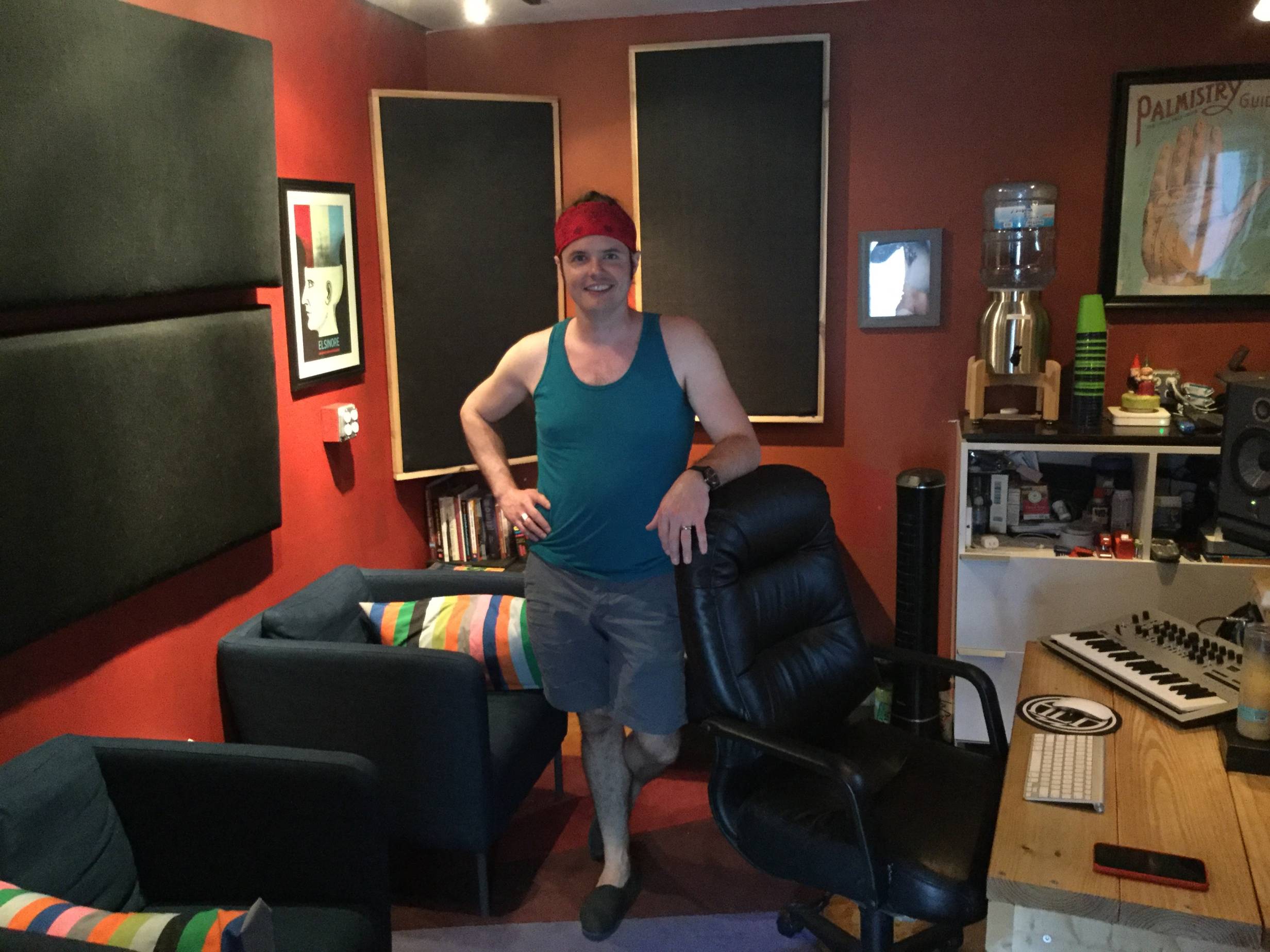
SP: How do you think your approach to lessons spills over into your role as a producer and engineer?
Groff: I think that my level of confidence with talking to people about what they are doing is a really big deal. I want people to leave feeling like they were just enlightened and shown something, and inspired to practice it. I want them to get in here and be like, “I bet I could ask him to play any of these things and he’d be ok with that.” That’s the point of me having so many instruments. I want somebody to not be afraid to say, “Hey, I’ve heard of a Wurlitzer. Can we do a lesson on playing that today?” Or like, “Hey, you have a lot of guitar pedals. Can you show me how they all work? I’ve been wondering about pedals.” Or like, “Oh, I’ve never played a 12-string guitar, or a bass guitar.” You know?
SP: Are you into more of a live sound, or more of a polished, multitracked, overdubbed sound?
Groff: I have definitely grown to love the more produced, polished, long term vision of a record. But most bands aren’t really at that stage, financially or creatively. Pretty much every band that I have worked with has come in and said, “Yeah, we’d like to come in, and set up, and try to capture it all in, like, a day.” And I’m like, “Ok! Ten songs in a day, if you guys are ready, and can get them in one to three takes, yes. We can get a basic mixdown. But guys, honestly, the last Elsinore record, we took our time, we spent ten thousand dollars, and put in hundreds of hours. We did 14 days straight when we did Push/Pull, and then over three weeks I did all of the final vocal tracking and overdubs, and then I spent another 12 days in Portland, mixing it. Like, full days.”
So, yes. When you ask me about it, I’m like, “Yes. We can do the thing where everybody sets up in a room, and capture REALLY WELL what you do when you practice in your basement. Like, Yes, you can do that.” And it can sound really good! As I’ve gotten better microphones and preamps, and better headphone systems, I have had very good experiences with everyone setting up – as you can see, [walks over to small, isolated drum room], drum room, with glass in every door, so everyone can see everybody, no matter where they are. I designed it that way. So I show them the angles, and I say, “Yeah! We can do that, if you guys are SO practiced that you want to try it, then let’s do it.” But then everybody who I have recorded like that has been like, “Okay, but can add stuff on top of that?” And I’m like [holds his hands in the air], “That’s what I was talking about!” You can do it all at once, but most people are going to say, “Well…”
SP: Let’s beef that up.
Groff: Yeah! “Let’s double track that guitar. Let’s overdub vocals, because I don’t want to hear the strumming while I’m playing.” As you start to understand how that goes down, logistically, you will have more questions for me, and we’ll figure it out.
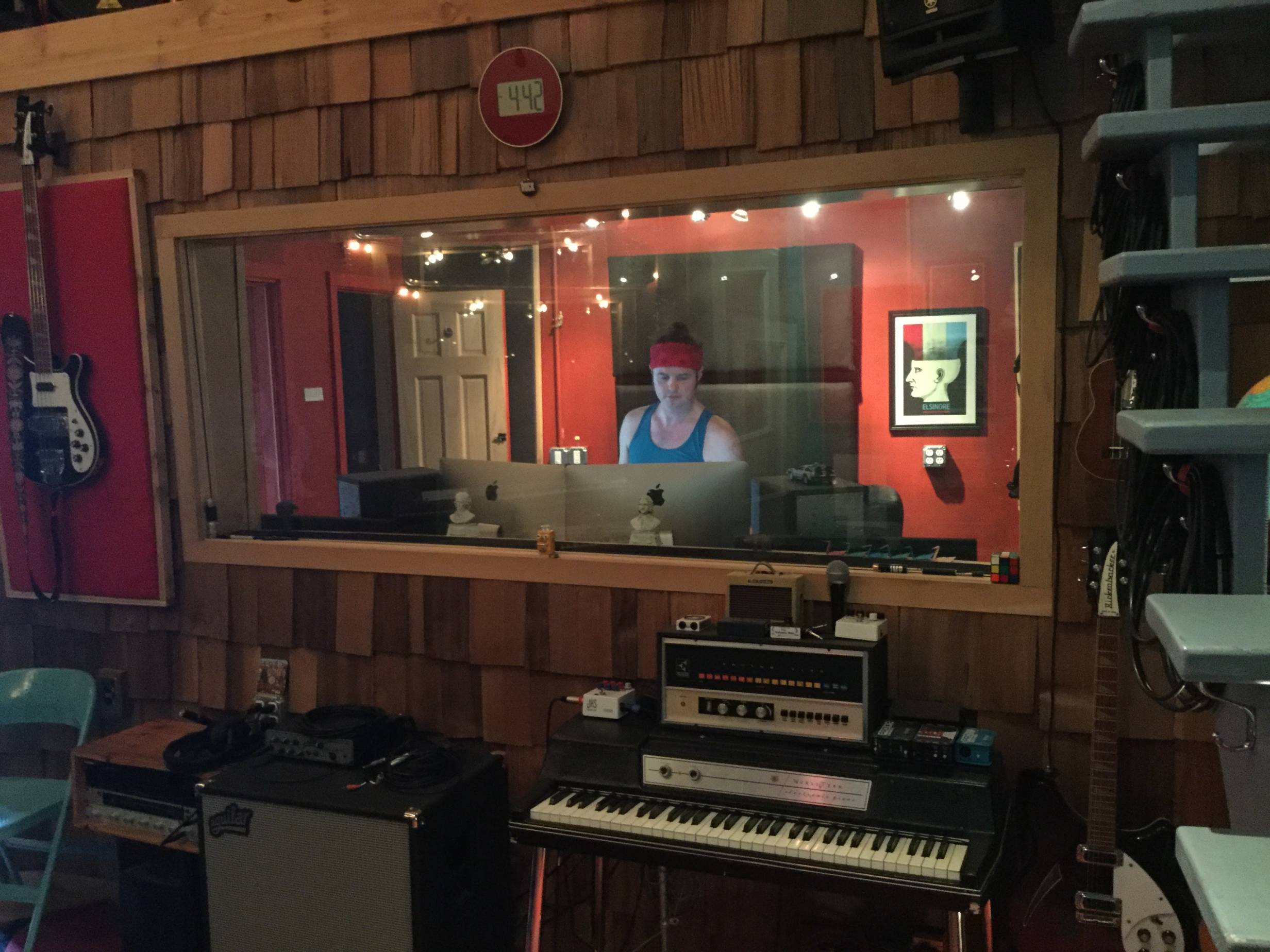
SP: So, it sounds like your preference is to build a track up, layer by layer.
Groff: Yeah! And it’s because I know, personally, and from working with people, that when we get done at the end of this ten-hour day, and we race to get it mixed so that you don’t have to pay for a whole other hour, you’re going to think, “Well, this kind of sounds like a really good demo.” And it’s like, “Yeah! Because you spent ten hours on ten songs!” So people do gradually realize, even throughout a day, like, “Yeah. Let’s just slow down. Everybody slow down. We’ll book another day.” Which is kind of nice. It’s immediate gratification. Because you CAN capture a really amazing life performance, and it could sound like Simon and Garfunkel. I mean, people have been tracking live for a VERY long time, so if you’ve got the chops, it’s totally possible, and I would never say no. I’m always going to say, “Yeah! Blow my mind. I want to see this.” I want the experience of being like, “You nailed this in one take! Vocals and everything!”
SP: What do you think is gained by the more produced, “long game” approach you are describing, versus the live take?
Groff: What’s lost for the live take? Honestly, for a band to walk in, and have all of their tone, and intonation on their guitars, and noise floor on their amps, where there’s no hiss and crackle, and where the drummer sits down right away and tunes the drums so that they sound like the best possible version of that drum kit – that just doesn’t happen. People don’t know that. I didn’t know that for a few years. Like, “Oh yeah, last time, I wasted three hours trying to keep my guitar in tune, when it turns out it just needed to go to the shop to get intonated.” So, the chances of a band like that walking into a studio like mine, where it’s casual, but filled with amazing gear that can capture an amazing record, is not very high, from what I have seen in the past.
So, because of that, being able to take the time, and say, “Let’s book a five-hour session on Friday, and knock out as much of the guitars as we can.” Then, from song to song, we can take the ten minutes to get the tones for that song figured out. We can be like, “Oh, yeah, that’s really trebly,” because the way that your gear sounds in your basement is not going to sound the same here. So I think that’s really the thing. Unless everyone’s brains, and instruments, and morale, and confidence are blasting at ten, the live thing does sound like you are capturing a rehearsal… but, you know, in a dry, well-mic’ed environment. [laughs] And THEN, people are like, “Oh! So that’s what my bass part sounds like with the drums? It was always so washy, I thought we were together! I’m accenting the wrong beat!” Those sorts of things immediately show their face, so the long game is great, because you do get to tweak everything. However, the danger is over-tweaking, over-deconstructing, over-replacing. “I could do that better! One more take! One more take!” and then fifty takes later, you realize the first one was best.
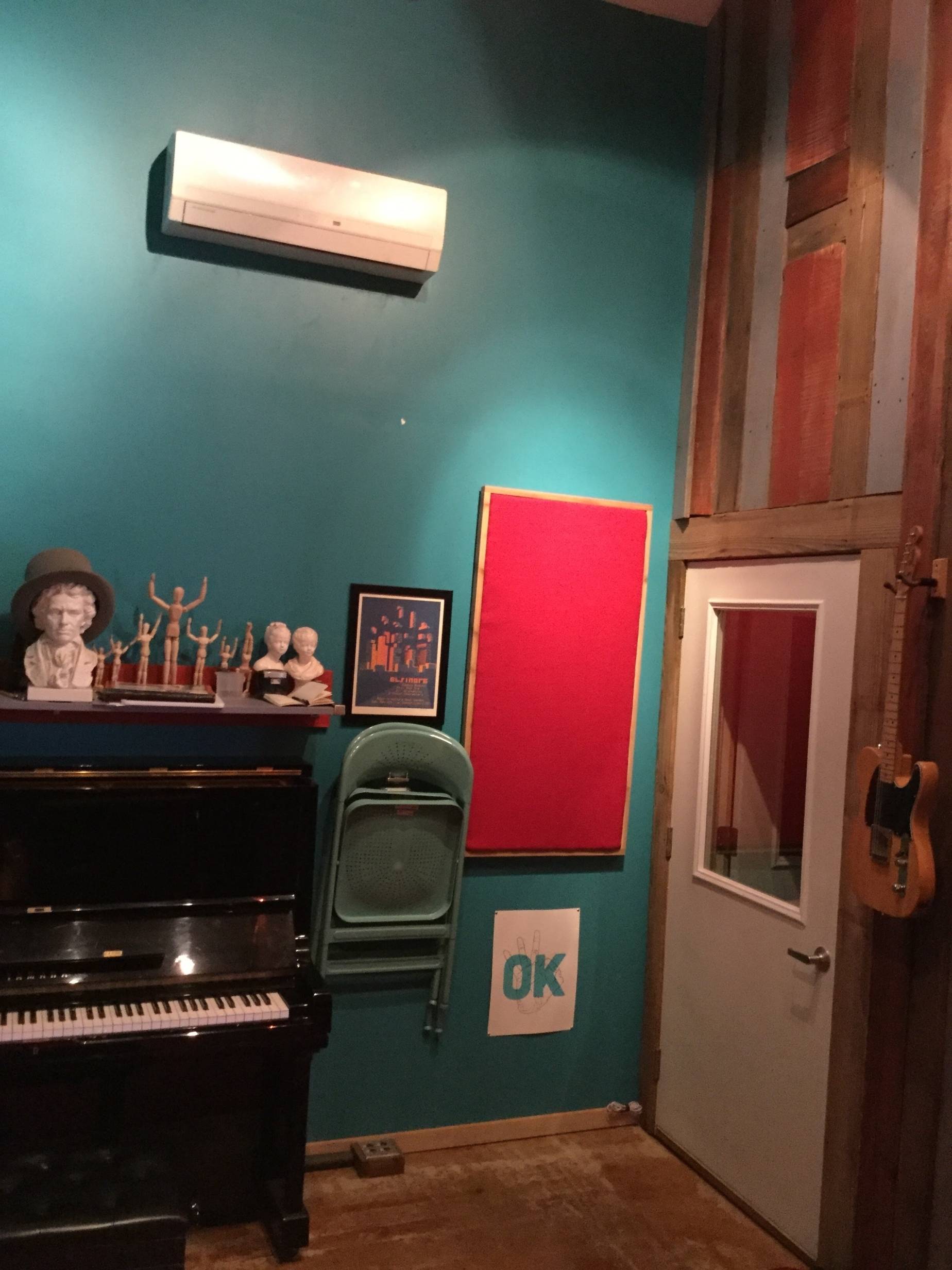
SP: So is it a fair assessment to say that your ideal client is someone who is really willing to invest some time and money, and who is seeking a really polished end result, versus like a high school trio who is trying to get their four-song demo recorded?
Groff: No, actually! I love getting to be the medium for a new, young, or not young band, trying to get a demo off of the ground, KNOWING that it’s going to be just a demo. There is a local band, called Slick Lisp, who came in here, they had four or five songs, and wanted very much to do a super live, demo-quality-or-better-if-possible recording. Ended up with an EP that sounded very, very cool, but it was a live, loose-here-and-there, kind of a demo. So I guess, to answer your question, it’s the band or person who expects to get a record that sounds like fifty hours, but they only want to put ten hours in. That’s the thing where it’s like, “Dude, we are not going to get that.” Where it’s like, “You sent me the Tame Impala record [as a sample goal], but you only want to spend two hours per song. That’s a record that took five thousand hours, and five hundred thousand dollars of gear, and was mixed by an industry name.”
SP: It’s not a realistic expectation.
Groff: Exactly. Right. I couldn’t record something very crappily, and then massage it for two hours. I don’t have the years of experience. I’m also two thirds musician, one third producer/engineer, because I am just using my experience to work with other people. I went to school to be a musician, and a performer, and a member of a band. I didn’t go to school to be an engineer. I’m doing it because I have the itch and I want to do it.
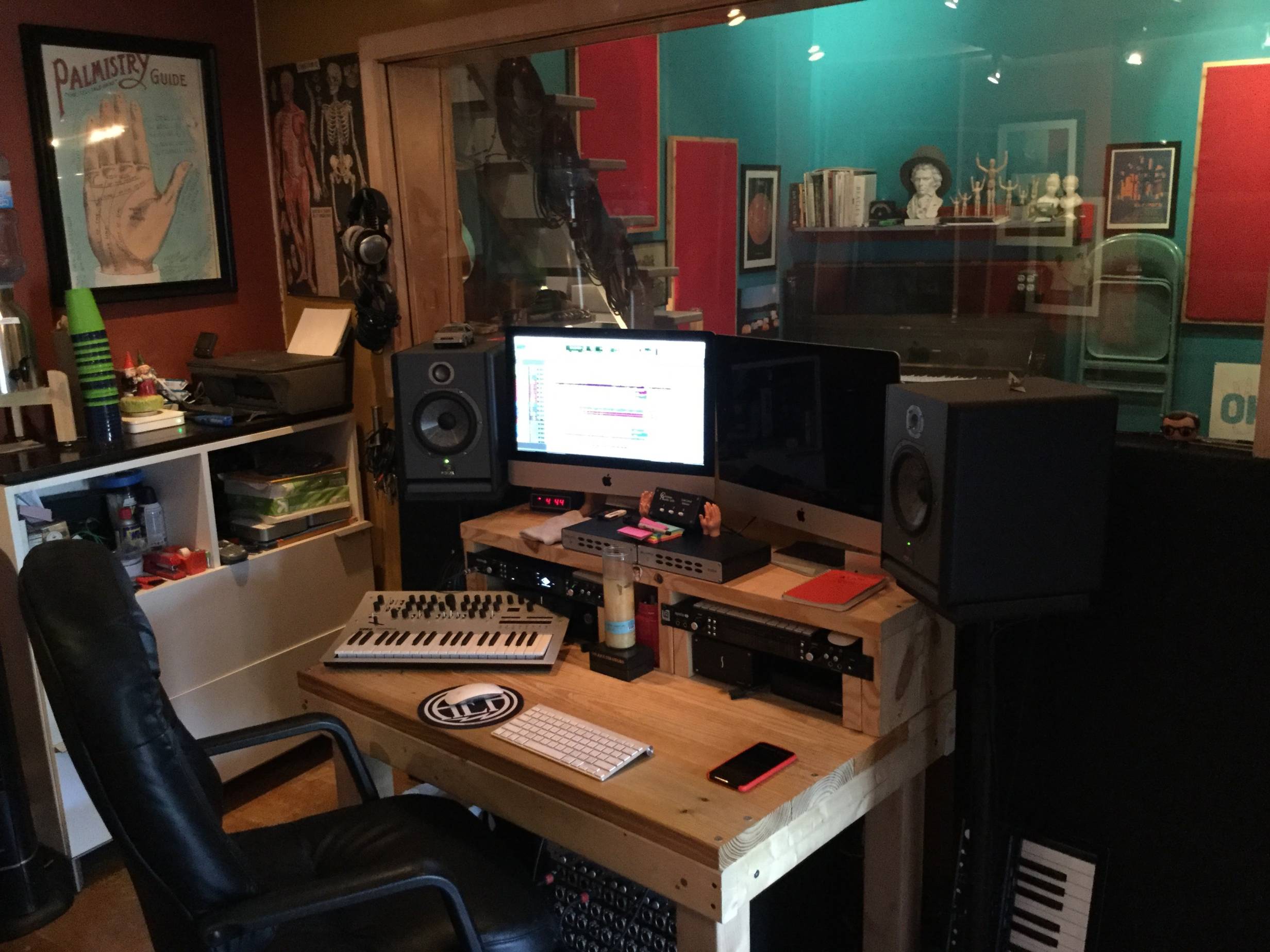
SP: What’s your earliest recording memory as an engineer/producer?
Groff: I had been in a couple bands in college, and recorded with them, but did not really get the itch at that time. It wasn’t until 2004, recording at Pogo [Studio, formerly in Champaign], which was like this world class studio, with this soft spoken, intelligent genius behind the board. So Mark [Rubel, former owner and engineer at Pogo Studio, amongst other things] and I formed a friendship, and I got to watch him, and learn from him, like, “Oh, so THAT’S how you mic a grand piano!” That’s when I got the itch, but it wasn’t until 2007 and 2008, working with my friend Anthony Gravino, who is in Chicago, and this guy Adam Schmidt, who lives in Champaign-Urbana, when we were recording an EP that turned out to be Yes, Yes, Yes, that I really got the bug, watching Anthony, because he used ProTools, and Adam didn’t. Adam was using this thing that was kind of a weird, antiquated, ‘90’s recorder thing that I didn’t really get. He drove it like a spaceship that he’d been flying for years – it was like the Millennium Falcon, you know. Like he knew all of the buttons, but operationally, to me, it just looked crazy. Seeing ProTools, it just made sense to me, visually, and Anthony was really good about explaining things when I asked the smallest or biggest questions. He’s definitely one of, if not the lynchpin, for why I have the studio the way I do.
SP: Is there anything in particular you feel like you do especially well? Do you have a signature?
Groff: Well, my primary instrument is my voice. Above all, I am a singer. That’s what my degree was in: Vocal Performance and Musical Composition. I’m not the greatest guitar player in Champaign-Urbana, by any means, but I think that I teach it very well. People tell me that I make them comfortable and make them want to practice. So that’s really my bread and butter. Getting someone to sing something in the best possible way, to give the best possible version of their own voice.
SP: Awesome! Alright, final question: is there a ballpark figure that you would throw out there for a four-piece band, trying to get a demo recorded?
Groff: So, my rate is $50 an hour, and that includes me being here as an engineer and producer, and [the musicians] being able to use everything and anything in the studio. I give a ten hour day rate of $450. So, the tenth hour is free, basically. So if a band has three songs, and they’ve been practicing a lot, we could be done in two hours. So $100 could get a three to five song demo, if that’s all you want. People ask me that kind of question all the time: how much time per song? It’s like, “Well, can your band come in, get set up, and play your songs front to back with no mistakes? If yes, then probably 35-40 minutes per song.” But it does totally depend on the perfection level of the performance, and what end result you want.
SP: Thanks for your time, Ryan!
Ryan Groff can be reached at [email protected].








